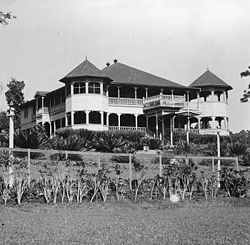
Olaf Frederick Nelson
Encyclopedia


Mau movement
The Mau was a non-violent movement for Samoan independence from colonial rule during the early 1900s. The word 'Mau' means 'opinion' or 'testimony' denoting 'firm strength' in Samoan...
for Samoa
Samoa
Samoa , officially the Independent State of Samoa, formerly known as Western Samoa is a country encompassing the western part of the Samoan Islands in the South Pacific Ocean. It became independent from New Zealand in 1962. The two main islands of Samoa are Upolu and one of the biggest islands in...
n independence from colonial
Colony
In politics and history, a colony is a territory under the immediate political control of a state. For colonies in antiquity, city-states would often found their own colonies. Some colonies were historically countries, while others were territories without definite statehood from their inception....
rule.
He was born on 24 February 1883 at Safune
Safune
Safune is a traditional village district on the central north coast of Savai'i island in Samoa. It lies within the electoral constituency of Gaga'ifomauga. Safune is the birthplace of Mau leader Olaf Frederick Nelson and the filming location of Moana , one of the first documentaries made in the world...
on the island of Savai'i
Savai'i
Savaii is the largest and highest island in Samoa and the Samoa Islands chain. It is also the biggest landmass in Polynesia outside Hawaii and New Zealand. The island of Savai'i is also referred to by Samoans as Salafai, a classical Samoan term used in oratory and prose...
, Samoa
Samoa
Samoa , officially the Independent State of Samoa, formerly known as Western Samoa is a country encompassing the western part of the Samoan Islands in the South Pacific Ocean. It became independent from New Zealand in 1962. The two main islands of Samoa are Upolu and one of the biggest islands in...
, and died in Apia on 28 February 1944. He was a successful planter, businessman and statesman. He was the son of a Swedish trader August Nilspeter Gustav Nelson and his Samoan wife, Sina Masoe, whose family had links to the Sa Tupua (a prominent chiefly family). His name Taisi is a matai
Fa'amatai
Fa'amatai is the chiefly system of Samoa, central to the organization of Samoan society.It is the traditional indigenous form of governance in the Samoa Islands, comprising American Samoa and the Independent State of Samoa...
chief title from his mother's family.
Nelson's early years saw him working in his father's business, and he became a successful merchant in his own right. He expanded his father's copra trading business throughout the islands, and by the time he was thirty five, Nelson was one of the wealthiest members of the Apia community. He was influential in both the Samoan and European communities.
Under German rule, when the country was called German Samoa
German Samoa
German Samoa was a German protectorate from 1900 to 1914, consisting of the islands of Upolu, Savai'i, Apolima and Manono, now wholly within the independent state Samoa, formerly Western Samoa...
(1900 - 1914), the colonial administrators treated Nelson as an equal. But after New Zealand
New Zealand
New Zealand is an island country in the south-western Pacific Ocean comprising two main landmasses and numerous smaller islands. The country is situated some east of Australia across the Tasman Sea, and roughly south of the Pacific island nations of New Caledonia, Fiji, and Tonga...
seized control in 1914, Nelson was excluded and alienated by the new government. Despite being elected to the Legislative Council in 1924, he could do little as he and the other elected members were constantly overruled by the more numerous government appointees. This treatment turned Nelson into one of the major forces in the Samoan independence movement, known as the Mau
Mau movement
The Mau was a non-violent movement for Samoan independence from colonial rule during the early 1900s. The word 'Mau' means 'opinion' or 'testimony' denoting 'firm strength' in Samoan...
.
In May 1927 Nelson founded a newspaper, the Samoa Guardian, to support its claims. In response to his growing public dissent, the New Zealand administration tried to brand Nelson as unscrupulous and a trouble maker.
The colonial administration's desperation to silence Nelson led them to exile him in January 1928, along with two other part-European members of the Mau. During his five years of exile, Nelson took his protests as far as the League of Nations
League of Nations
The League of Nations was an intergovernmental organization founded as a result of the Paris Peace Conference that ended the First World War. It was the first permanent international organization whose principal mission was to maintain world peace...
in Geneva.
Six months after his return to Samoa, Nelson was sentenced to ten additional years in exile as well as eight months imprisonment in New Zealand. This was cut short in 1936, after Labour
New Zealand Labour Party
The New Zealand Labour Party is a New Zealand political party. It describes itself as centre-left and socially progressive and has been one of the two primary parties of New Zealand politics since 1935....
won the New Zealand general election in 1935. He returned to Samoa, and helped in the signing of the co-operation agreement between Samoan leaders and the New Zealand administration.

